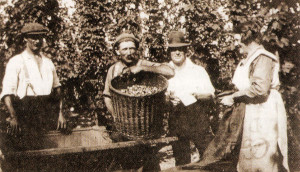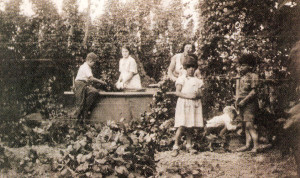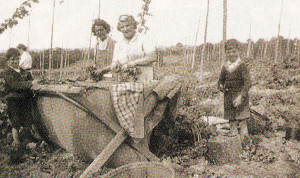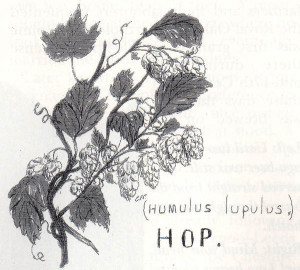
Early in the first week of September, almost the whole village would walk to various local farms, most of which then had some areas of hops. Our family went to Baron’s Grange. Our annual school holiday at the time was from the third week in August until the last week in September, conveniently taking in the hop harvest!
At the first hop field, pickers were grouped around sets of five to six bins. A
bin was a collapsible wooden frame (for easier transport) into which was fixed a hessian sack to form a long, open bag. Hop bines were pulled down across the bins and we picked the hops from them straight into ours.
The bines had been grown in groups of four, fanning out at the top. A team of workers would have toiled in the hop field from March until July, twisting the bines to encourage them to grow up the strings. They were grown in rows about five feet apart, forming channels through which our bins were moved forward as we stripped the bines.
In our part of Sussex, by the way, a hop field was always called a hop garden.
Payment for picking was by the bushel. The amount you’d picked was checked by the so-called ‘measureman’ who, with his bushel basket, would scoop the picked hops out of the bins into an open sack called a poke. The ‘tally-lady’ who accompanied him would then enter the number of bushels on to your tally card and sign it.
The card was kept very carefully as it was a record for your payment at the end of hop-picking.
Normally the hops were measured out twice day by the measureman before being carted to the oasthouse for drying. The second measure was late in the afternoon so that the oast was loaded ready for the night’s drying. Work in the oast went on round the clock, and ideally the amount of hops picked would match its capacity.
Once started, hop-picking and drying controlled the life of the whole village. Families soon fell into a routine of preparing for the next day. Vegetables were made ready and left in water that had been brought in from the well, or, as we were in a council house, from the tanks outside the gate.

Fuel for the kitchen range was laid out in the grate. This made it easier for one member of the family (in our case it was usually me as I had a bike) to hurry home first after the day’s hop-picking, light the fire and get the meal going.
It was also my job to feed the chickens and collect the eggs night and morning.
After 60 years my memories of childhood hop-picking are still clear, even from before the war. I remember that we had at least two very wet hop-picking seasons in the late 1930s, when it was a struggle to get the daily quota picked and carted off the field. We stood at the bins with hop pokes around our shoulders and over our heads in an attempt to keep reasonably dry.
Often we had to work late on a Saturday to pick the number of pokes needed to keep the oast going.
At this time the oast was fired by coal, and on most days, if we were in a garden near the oast, we took large potatoes to the drying men to bake in the oast fire for us. A fire was also lit at lunch time in the hop garden for brewing billycan tea and toasting bread. This had to be put out, though, before starting work again after lunch.
Everyone, young and old, had to pick hops. Even as small children we were expected by Mum to pick a decent amount before being allowed off to play.
Favourite games for us boys were climbing trees or, best of all, damming the ditch that ran around the hop-garden. We played a lot in that ditch, out of sight of our elders.
Early after war with Germany was declared in September 1939 Dad went into the RAF, and a little later into the RAF Regiment. This meant that at the age of around 12 I was the man of the house. Even as youngsters we’d learned that war was to come. All civilians had been issued with gas masks, there had been blackout practice, and the papers and wireless kept us up-to-date with events in Europe.
The hops had to be picked, though, war or no war. Our favourite ditch had been selected by us boys as a bolthole if we were ever in danger of being strafed by an enemy plane. The air-raid siren did sound once during the first week, but all we saw was one of our own Hurricanes flying by.
During that three weeks’ hop-picking, no child left the area of the bins. We stood and picked hops as we listened to the grownups talking of the impending showdown with Hitler. Plenty of them remembered the Great War of 1914-18.
The excitement of the situation was mixed with a fear of the unknown. The weather, though, was glorious.

Uncle George came over to the hop garden one day to say good-bye. He was in his Territorial Army dress uniform and looked very smart. He said they were going to Newhaven to embark with the British Expeditionary Force. I remember saying farewell to my favourite uncle. I felt like crying, but didn’t because I was the man of the house now. I’d fight too if I had to.
Food became rationed. I seem to recall that we were issued with ration books even before war was declared. All was quiet, although we heard that some of our ships had been sunk by U-boats and there were stories of German pocket battleships sinking others.
But for us boys it was “business as usual”. When that year’s hop-picking finished we went back to school. Once a day we had to do a lesson while wearing our gas masks. Men came to the school and dug a long trench in the sports field for protection if there were an air-raid. We regularly practised running from the classroom to the trench. It was becoming all very real and frightening.
When the 1940 hop-picking came round, the mood of the village was quite different. Our mums wanted all us closer to home (our school was at Playden, two and a half miles away) so all the Iden children went to a makeshift school in the village church hall, infants at one end of the big room and seniors at the other. Stage curtains were hung as a division between us.
As we picked hops during the holidays that year there were quite a few air-raid warnings, mostly on account of German planes lost in the early morning fog. The German Army might have taken France, but there were still hops to be picked. Again, it was a fine September. Dunkirk was our last battle on the continent and the Army was back to defend us. Uncle George and a great many others were missing or prisoners of war.
The Battle of Britain began that July, and by September day by day dog-fights raged overhead and we became quite used to seeing planes crash. We still picked the hops, though. It was a very exciting and frightening time.
Many of the hop-pickers had lost husbands and sons already. The news came that Uncle George and Mr. Crouch were prisoners of war. We felt relieved that at least they were alive, but Mrs. Crouch cried quietly as she picked the hops. My mum tried to comfort her – she was good at that.
The air battles raged every day. I remember that September 15 was a Sunday and we ducked and dived all day. That date is now recognised, though, as the day when the battle swung in our favour. We youngsters swapped stories of what we had seen on that long Sunday as we picked hops the following day and the rest of the week.
“Hitler won’t be invading now until next year,” we heard, and felt all the better for that.



The hop-picking over, it was back to school. Mum had taken us to Hastings on the train the previous week and I had a new pair of winter boots, new school trousers and a grey flannel shirt. Brother Dave had the same, all from the hop-pick-ing money.
In 1941 the hop-picking weather started wet – very wet indeed. As we picked there wasn’t the usual cheerful banter. Pickers had their own thoughts and worries. Had we known that by Christmas America would have entered the war on our side, things might have seemed a bit better.
Mum got on very well with the few travelling families who picked hops on the same farm. One day a mother who was illiterate received a letter from her son, who was serving with the forces. She asked mum to read it to her, which she did willingly and then wrote down a dictated reply.
Very soon, mum was spending a lot of time reading letters for such people and writing letters for them to their loved ones. To repay her kindness, there were always two or three extra pickers at our bin so we had a good tally that year. Even the sun shone again after that first wet week.
Soon after hopping was finished, Dad came home on leave, and what a wonderful seven days we had with him. He had to go back on the following Saturday, leaning out of the carriage window on the train and waving until it was out of sight. Nobody asked if we had platform tickets as we left – we didn’t! Mum cried a lot, I remember, and I tried to comfort her and vowed to myself to do my best to be good.
We walked home in the growing darkness, looking at the stars, and stopped at the top of Rye Hill where Mum pointed out the Pole Star.
Although most foods were rationed or in short supply, we in the country areas lived fairly well. Most of the year wild rabbits were available, and we kept chickens for
eggs and meat. We also had a share in a pig which was fattened by a friend. We grew our own vegetables, storing quite a lot for use in the winter. They were mainly carrots, potatoes, cabbage, kale and sprouts. We ate runner beans fresh over a long period, but mum also salted them in jars for later use as we were so fond of them.
In the hop garden, our packed lunches included outdoor-grown tomatoes, ridge cucumber, spring onions or a large slice of main crop ones.
We all had healthy appetites, the outdoor life and sulphurous smell of the hops seeming to make us all the hungrier, especially the children.
By the time hopping started in 1942 I’d left school and been at work for six months in the River Board Office. I then began as an apprentice at the local Rock Channel Shipyard. After a spell helping to build ships’ lifeboats, I started on the slipway, working on 75ft. motor fishing vessels, so I didn’t see much of the hop garden that year.
Mum and my brothers went as usual with Aunty Grace and our cousins who had come to stay with us. Uncle Harry, like Dad, was in the RAF. The war was hotting up, the German Luftwaffe had a new lease of life and hit-and-run raids were an almost daily occurrence along the South-East coast.
Although I didn’t pick any hops I could still smell them all the time, as the whole area reeked of their aroma. One good aspect of the family working in the hop fields during the war was that extra ‘harvest rations’ were allocated to each farm and these were shared among the workers. The little extra cheese, butter, sugar, tea and sometimes bacon, as well as a few clothing ration coupons, came in very handy.
What also helped was that when I started at the shipyard I was issued with clothing coupons for buying overalls and a voucher for an alarm clock and a vacuum flask. I also qualified for some extra cheese, butter and sugar and, I think, tea. I believe mum swapped some of my clothing coupons for more edible fare, though!








